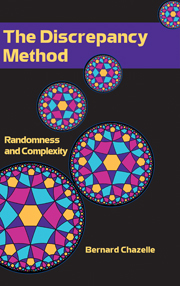Book contents
- Frontmatter
- Contents
- Preface
- 1 Combinatorial Discrepancy
- 2 Upper Bound Techniques
- 3 Lower Bound Techniques
- 4 Sampling
- 5 Geometric Searching
- 6 Complexity Lower Bounds
- 7 Convex Hulls and Voronoi Diagrams
- 8 Linear Programming and Extensions
- 9 Pseudorandomness
- 10 Communication Complexity
- 11 Minimum Spanning Trees
- A Probability Theory
- B Harmonic Analysis
- C Convex Geometry
- Bibliography
- Index
11 - Minimum Spanning Trees
Published online by Cambridge University Press: 05 October 2013
- Frontmatter
- Contents
- Preface
- 1 Combinatorial Discrepancy
- 2 Upper Bound Techniques
- 3 Lower Bound Techniques
- 4 Sampling
- 5 Geometric Searching
- 6 Complexity Lower Bounds
- 7 Convex Hulls and Voronoi Diagrams
- 8 Linear Programming and Extensions
- 9 Pseudorandomness
- 10 Communication Complexity
- 11 Minimum Spanning Trees
- A Probability Theory
- B Harmonic Analysis
- C Convex Geometry
- Bibliography
- Index
Summary
Some of the most intriguing problems in computer science predate the field itself. Computing minimum spanning trees (mst) is one of them. As far back as 1926, Borůvka asked how to find a minimum-cost tree spanning the vertices of a connected graph with costs assigned to the edges. According to Nešetřil [239],
This is a cornerstone problem of combinatorial optimization and in a sense its cradle.
Amazingly, after all of these years, the problem is still open. History aside, the minimum spanning tree problem is remarkable for several reasons. One of them is that it can be solved very quickly. Simple textbook solutions run in time O(m log m), where m is the number of edges. This is astonishing. Problems of that flavor are usually NP-complete or at least involve complicated polynomial-time procedures. But the minimum spanning tree problem is special. As a particular case of matroid optimization, it can be solved by a greedy approach. Crudely put, the hard part in finding the right answer is not if but when. Almost anything you try will eventually produce a minimum spanning tree. The question is, How long will it take?
Most methods based on divide-and-conquer split up the graph according to its combinatorial structure or to its distribution of edge costs. Random sampling allows us to do both at once, and by exploiting this fact, an optimal probabilistic solution was discovered.
- Type
- Chapter
- Information
- The Discrepancy MethodRandomness and Complexity, pp. 376 - 429Publisher: Cambridge University PressPrint publication year: 2000



